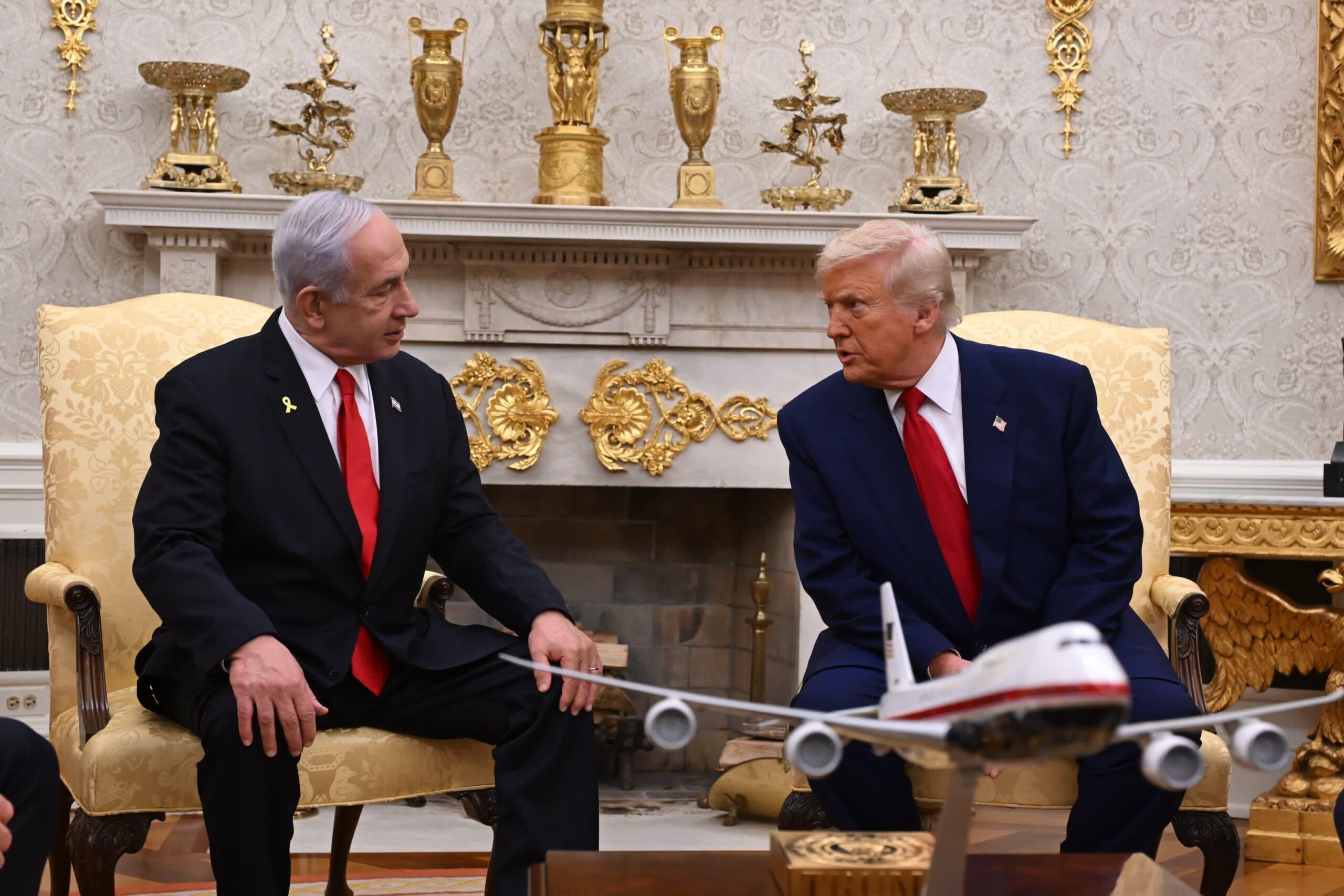
Prime Minister Benjamin Netanyahu and US President Donald Trump in the Oval Office at the White House in Washington today. Photos: Avi Ohayon (GPO)
Washington/Gaza/Cairo/Jerusalem/Geneva: For over a month, the Gaza Strip has been cut off from the outside world, with no commercial or humanitarian supplies allowed to enter, despite aid piling up at crossing points. The humanitarian crisis in Gaza has reached a boiling point, with 2.1 million people trapped in a desperate struggle for survival.
The consequences are dire, and the humanitarian community today sounded the alarm, but Israeli Prime Minister Benjamin Netanyahu emphasized the shared commitment of both Israel and the United States to eradicate Hamas while also ensuring the safe return of all hostages after he met with US President Donald Trump at the Oval Office in Washington. The two leaders engaged in discussions about Gaza today during Netanyahu’s second trip to the United States within two months.
Netanyahu remarked, “The President looked at me and told the journalists present: ‘This man is working tirelessly to free the hostages.’ I hope this dispels the false narrative suggesting that I am not dedicated to their release or that I lack concern. I genuinely care, I am actively pursuing this goal, and I believe we will succeed.”
He also mentioned that they talked about President Trump’s vision, noting, “We are currently in discussions with various countries regarding the potential resettlement of many Gazans. This is crucial because ultimately, this is the direction we need to take.”
Meanwhile, with the tightened Israeli blockade on Gaza now in its second month, the heads of the Office for the Coordination of Humanitarian Affairs (OCHA), the United Nations Children’s Fund (UNICEF), the United Nations Office for Project Services (UNOPS), UNRWA, World Food Programme (WFP), and the World Health Organization (WHO) today called for world leaders to act urgently to protect civilians, facilitate aid, release hostages and renew a ceasefire.
A joint statement from these humanitarians appealed to world leaders to act – “firmly, urgently and decisively” – to ensure the basic principles of international humanitarian law are upheld. No aid has entered Gaza since March 2, 2025, deepening the hunger and malnutrition crisis, leaving families without clean water, shelter, and adequate health care, and increasing the risk of disease and death.
“We are witnessing acts of war in Gaza that show an utter disregard for human life. New Israeli displacement orders have forced hundreds of thousands of Palestinians to flee yet again, with no safe place to go,” said the joint statement which was signed by Tom Fletcher, UN Under-Secretary-General for Humanitarian Affairs and Emergency Relief Coordinator, Catherine Russell, Executive Director, UNICEF, Jorge Moreira da Silva, Executive Director, UNOPS, Philippe Lazzarini, Commissioner-General, the United Nations Relief and Works Agency for Palestine Refugees in the Near East (UNRWA), Cindy McCain, Executive Director, WFP, and Dr. Tedros Adhanom Ghebreyesus, Director-General, WHO.
Yesterday, on World Health Day, with the theme “Healthy beginnings, hopeful futures,” WHO said the Gaza Strip continues to be one of the most dangerous places to be a child and where pregnancy is clouded by fear due to ongoing violence, displacement and lack of medical access. Between March 18 and April 4, 2025, since the resumption of hostilities, reportedly more than 500 children and 270 women have been killed.
Due to the aid blockade, WHO’s supplies for maternal and child health, including for caesarean sections, anaesthesia for delivery and pain management, intravenous fluids, antibiotics, and surgical sutures, are critically low. Blood units needed for complicated deliveries are in extremely short supply. WHO partners report that essential equipment and medicines, such as portable incubators, ventilators for neonatal intensive care, ultrasound machines, and oxygen pumps, along with 180,000 doses of routine childhood vaccines — enough to fully protect 60 000 children under the age of two — have not been permitted to enter, leaving ill newborns and young children without the life-saving care they urgently need.
The health system, already fragile, is on the brink of collapse, with essential medical and trauma supplies rapidly depleting. Hospitals are overwhelmed with casualties, and medical staff are struggling to cope with the influx of patients. The situation is particularly precarious for pregnant women and newborns, with 55,000 women pregnant in Gaza, one-third facing high-risk pregnancies that require specialized care.
The numbers are stark. Approximately 130 babies are born daily, with 27% delivered via caesarean section, and 20% born preterm, underweight or with complications that demand advanced care now in short supply. The lack of essential medicines and equipment is putting the lives of these vulnerable newborns at risk. Portable incubators, ventilators for neonatal intensive care, ultrasound machines, and oxygen pumps are just a few of the critical supplies that have not been permitted to enter Gaza.
The food shortage is deepening the crisis and threatens to reverse the progress made in food security during the ceasefire. Malnutrition is a growing concern, particularly among pregnant and breastfeeding women. A recent Nutrition Cluster analysis found that 10-20% of 4,500 surveyed women were malnourished, a worrying trend that threatens the health and wellbeing of both mothers and their children. The closure of 21 outpatient malnutrition treatment sites has disrupted life-saving care for over 350 acutely malnourished children, leaving them without access to the treatment they desperately need.
The conflict has taken a devastating toll on children, with over 1,000 reported killed or injured in the first week after the ceasefire breakdown.
The 25 bakeries supported by the WFP during the ceasefire have been forced to close due to flour and cooking gas shortages, leaving many without access to basic necessities like bread. New Israeli displacement orders have forced hundreds of thousands of Palestinians to flee, with no safe place to go, adding to the sense of uncertainty and fear that pervades the Gaza Strip.
At least 408 humanitarian workers, including over 280 from UNRWA, have been killed since October 2023.
– global bihari bureau




